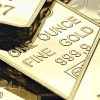OPENING CALL: The Australian share market is expected to open lower. The SPI200 futures contract expected to open down 13 points.
Top Senate lawmakers questioned Facebook’s plans for its own cryptocurrency, with the banking committee’s leading Democrat saying the social-media giant isn’t trustworthy enough to operate its own digital money.
The yield on the 10-year Treasury note rose to 2.124% in recent trading, according to Tradeweb, from 2.092% on Monday
Overnight Summary
Each Market in Focus
Australian shares gave up early gains with a late-afternoon fade that saw the benchmark S&P/ASX 200 fall for a third-straight session.
The index eased 0.2% to settle at 6641.0, with energy and telecom stocks struggling the most.
Rio Tinto lost 0.6% following a quarterly production update and news that development of its big Mongolian copper mine has been delayed, while Oil Search pulled back 2.2% after logging a drop in quarterly output and revenue.
Quarterly numbers from the resources space continues Wednesday with fourth-quarter production due to BHP.
U.S. stocks slipped intraday after a set of mixed second-quarter earnings reports from three major banks.
The S&P 500 fell about 12 points, or 0.4%. The Dow Jones Industrial Average lost 64 points, or 0.2%. The Nasdaq Composite slipped 0.6%.
Stocks have risen to records recently, and investors are watching U.S. corporate earnings releases for clues on how companies are handling tepid economic growth and trade tensions between the U.S. and China.
U.S. Treasury yields notched gains intraday after retail sales data showed that American shoppers increased their spending in June.
The yield on the 10-year Treasury note rose to 2.124% in recent trading, according to Tradeweb, from 2.092% on Monday, after fresh data showed that prices for foreign-made goods imported to the U.S. fell sharply in June. It was the latest sign that inflation pressures are tame. Yields rise as bond prices fall.
Gold ended lower as a rise in U.S. retail sales contributed to a stronger U.S. dollar, pressuring prices for the precious metal.
The upbeat retail sales number, however, also lifted prices for silver, brightening the metal’s industrial demand prospects.
August gold trading on Comex fell $2.30, or 0.2%, to settle at $1,411.20 an ounce. On Monday, the yellow metal booked its highest most-active contract settlement since July 3, which saw a finish at $1,420.90 – the highest since May 2013, FactSet data show.
In other commodity markets, September wheat prices fell 1/4 cent to $5.07 1/2 cents.
Oil prices declined 4% after U.S. President Donald Trump and Secretary of State Mike Pompeo said that negotiations with Iran were advancing over the Middle Eastern country’s nuclear program.
U.S. crude futures were trading down 3% to $57.76 while global benchmark Brent was off 2.9% $64.54.
The WSJ Dollar Index added 0.3% intraday.
Elsewhere, the British pound fell to its lowest level against the dollar in two years after a debate between the U.K.’s leadership candidates appeared to raise fears of an abrupt Brexit.
Sterling dropped 0.6% against the dollar to $1.24, its lowest since April 2017. It fell 0.3% versus the euro to EUR1.11 after Boris Johnson and Jeremy Hunt, the two candidates vying to take over from departing Theresa May, both said Monday evening they wouldn’t accept the so-called Irish backstop previously agreed with the European Union as part of the long negotiations over Brexit.
European shares were on the rise, with the Stoxx Europe 600 up 1.35 points, or 0.35%, to 389.10.
The rise was the largest one-day point and percentage gain since July 3 and now is up for three consecutive trading days.
The German DAX was up 43.63 points, or 0.35%, to 12430.97 and now is up for two consecutive trading days. The French CAC-40 Index ended the day up 36.17 points, or 0.65%, to 5614.38, while the FTSE 100 Index was up 45.48 points, or 0.60%, to 7577.20.
Japanese stocks end down as falls in electronics and energy stocks offset any improvement in sentiment as a result of the Federal Reserve’s potential rate cuts.
Sony lost 3.0%. Oil distributor JXTG Holdings dropped 2.3%. The Nikkei Stock Average ended down 0.7% at 21535.25.
Korean stocks finished higher, buoyed largely by tech shares. The benchmark Kospi rose 0.5% to close at 2091.87. The main index moved in a narrow range for most of the session.
Offshore investors’ purchase of semiconductor stocks led the gains that were nonetheless limited by worries about likely weak second-quarter corporate earnings, Seoul-based Kiwoom Securities said.
Elsewhere, Hong Kong’s Hang Seng Index ended up 0.2% at 28619.62, lifted by casino stocks. Galaxy Entertainment Group and Sands China gained 2.9% and 2.4%, respectively. A Macau-based casino news website reported that daily revenues in Macau casinos in the first two weeks of July were 3% higher than those in June.
Malaysian shares closed lower, in line with broadly-negative Southeast Asian markets.
The Kuala Lumpur Composite Index closed 0.2% lower at 1668.94.
Indian shares close higher, led by gains in some auto and financial stocks. The BSE Sensex closed 0.6% higher at 39131.04 amid a mixed sentiment across Asia.






 Access +10,000 financial
instruments
Access +10,000 financial
instruments

